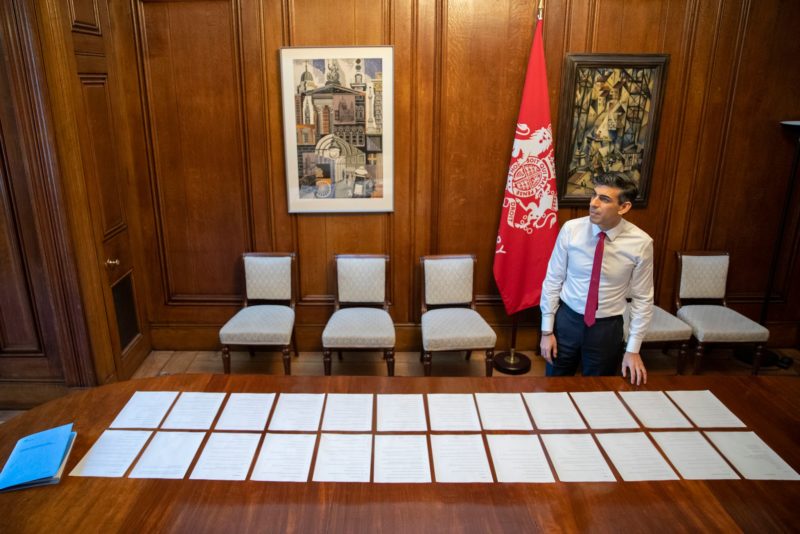Kerry McCarthy Labour MP for Bristol East
We’re heading for the toughest squeeze on living standards in a generation, with inflation at a 30-year high and 10 million people at risk of fuel poverty.
Today’s Spring statement was an opportunity for the Chancellor to come to the rescue but, at this crucial juncture, Rishi Sunak has got his priorities all wrong. He’s left working families practically defenceless in the midst of a devastating cost-of-living crisis.
And he certainly chose a side when it comes to who should shoulder the financial burden. The clearest indication of the Government’s approach is that landlords won’t pay a penny more in tax, but their tenants will.
As Labour’s Shadow Chancellor asked, “𝑓𝑜𝑟 𝑎𝑙𝑙 ℎ𝑖𝑠 𝑡𝑎𝑥 𝑟𝑖𝑠𝑖𝑛𝑔 𝑜𝑛 𝑚𝑖𝑙𝑙𝑖𝑜𝑛𝑠 𝑖𝑛 𝑡ℎ𝑒 𝑚𝑖𝑑𝑑𝑙𝑒, 𝑤ℎ𝑒𝑟𝑒 𝑖𝑠 𝑡ℎ𝑒 𝑖𝑛𝑐𝑟𝑒𝑎𝑠𝑒𝑑 𝑡𝑎𝑥 𝑐𝑜𝑛𝑡𝑟𝑖𝑏𝑢𝑡𝑖𝑜𝑛 𝑓𝑜𝑟 𝑡ℎ𝑒 𝑣𝑒𝑟𝑦 𝑤𝑒𝑎𝑙𝑡ℎ𝑖𝑒𝑠𝑡 𝑖𝑛 𝑠𝑜𝑐𝑖𝑒𝑡𝑦?”
𝐍𝐚𝐭𝐢𝐨𝐧𝐚𝐥 𝐈𝐧𝐬𝐮𝐫𝐚𝐧𝐜𝐞
- 𝐓𝐡𝐞 𝐍𝐚𝐭𝐢𝐨𝐧𝐚𝐥 𝐈𝐧𝐬𝐮𝐫𝐚𝐧𝐜𝐞 𝐭𝐡𝐫𝐞𝐬𝐡𝐨𝐥𝐝 𝐰𝐢𝐥𝐥 𝐛𝐞 𝐫𝐚𝐢𝐬𝐞𝐝 𝐛𝐲 £𝟑,𝟎𝟎𝟎, 𝐦𝐞𝐚𝐧𝐢𝐧𝐠 𝐩𝐞𝐨𝐩𝐥𝐞 𝐦𝐮𝐬𝐭 𝐞𝐚𝐫𝐧 £𝟏𝟐,𝟓𝟕𝟎 𝐩𝐞𝐫 𝐲𝐞𝐚𝐫 𝐛𝐞𝐟𝐨𝐫𝐞 𝐩𝐚𝐲𝐢𝐧𝐠 𝐢𝐧𝐜𝐨𝐦𝐞 𝐭𝐚𝐱 𝐨𝐫 𝐍𝐈.
The previously announced NI hike was the worst timed tax rise in history. As families had to choose between basic amenities, the Chancellor piled on the misery. This measure -which will ease the burden to an extent – is welcome. Yet when you consider the £12 billion this will raise in the context of the £11.8 billion lost to fraud and error in the Government’s business support schemes during the pandemic…. you have to ask: is it fair that working people pay for its failures?
𝐄𝐧𝐞𝐫𝐠𝐲 𝐁𝐢𝐥𝐥𝐬
- 𝐓𝐡𝐞 𝐇𝐨𝐮𝐬𝐞𝐡𝐨𝐥𝐝 𝐒𝐮𝐩𝐩𝐨𝐫𝐭 𝐅𝐮𝐧𝐝 𝐟𝐨𝐫 𝐥𝐨𝐜𝐚𝐥 𝐜𝐨𝐮𝐧𝐜𝐢𝐥𝐬 𝐭𝐨 𝐡𝐞𝐥𝐩 𝐭𝐡𝐞 𝐦𝐨𝐬𝐭 𝐯𝐮𝐥𝐧𝐞𝐫𝐚𝐛𝐥𝐞 𝐰𝐢𝐥𝐥 𝐛𝐞 𝐝𝐨𝐮𝐛𝐥𝐞𝐝 𝐭𝐨 £𝟏𝐛𝐧 𝐟𝐫𝐨𝐦 𝐀𝐩𝐫𝐢𝐥
Whilst this is a headline-grabbing figure, it’ll make a very limited impact in reality on the majority of households who’ll see a £1,300 average increase year-on-year by October. Millions more will slip into poverty as state pensions and benefits fail to match the rate of inflation. The Government rejected Labour’s proposal of a one-off windfall tax on oil and gas producers despite BP Oil bosses crowing that “we have more cash than we know what to do with” – families in Bristol do not!
𝐅𝐮𝐞𝐥 𝐃𝐮𝐭𝐲 𝐂𝐮𝐭
- 𝐅𝐮𝐞𝐥 𝐝𝐮𝐭𝐲 𝐰𝐢𝐥𝐥 𝐛𝐞 𝐜𝐮𝐭 𝐛𝐲 𝟓𝐩 𝐚 𝐥𝐢𝐭𝐫𝐞 𝐟𝐫𝐨𝐦 𝟏𝟖:𝟎𝟎 𝐆𝐌𝐓 𝐮𝐧𝐭𝐢𝐥 𝐌𝐚𝐫𝐜𝐡 𝟐𝟎𝟐𝟑
For the past 11 years fuel duty has been frozen at 57.95p per litre. This will bring down the cost a little but won’t be enough to compensate motorists for the rising prices at the pumps. It’s worth noting that over half of the poorest 20% of households in the country don’t have a car – and bus and train fares are still rising.
𝐄𝐧𝐞𝐫𝐠𝐲 𝐄𝐟𝐟𝐢𝐜𝐢𝐞𝐧𝐭 𝐇𝐨𝐦𝐞𝐬
- 𝐇𝐨𝐦𝐞𝐨𝐰𝐧𝐞𝐫𝐬 𝐰𝐢𝐥𝐥 𝐩𝐚𝐲 𝟎% 𝐕𝐀𝐓 𝐨𝐧 𝐞𝐧𝐞𝐫𝐠𝐲 𝐬𝐚𝐯𝐢𝐧𝐠 𝐦𝐚𝐭𝐞𝐫𝐢𝐚𝐥𝐬, 𝐬𝐮𝐜𝐡 𝐚𝐬 𝐬𝐨𝐥𝐚𝐫 𝐩𝐚𝐧𝐞𝐥𝐬 𝐨𝐫 𝐡𝐞𝐚𝐭 𝐩𝐮𝐦𝐩𝐬.
It’s good to see a move to a greener energy policy, but I fear this measure is a quick-fix; the Chancellor certainly had a chance to go further. Labour’s proposed a plan to retrofit 19 million homes and invest in home-grown renewables and new nuclear, which would see average savings of £400 on people’s bills.
𝐈𝐧𝐜𝐨𝐦𝐞 𝐓𝐚𝐱
- 𝐓𝐡𝐞 𝐛𝐚𝐬𝐢𝐜 𝐫𝐚𝐭𝐞 𝐨𝐟 𝐢𝐧𝐜𝐨𝐦𝐞 𝐭𝐚𝐱 𝐰𝐢𝐥𝐥 𝐠𝐨 𝐟𝐫𝐨𝐦 𝟐𝟎% 𝐭𝐨 𝟏𝟗% 𝐛𝐲 𝐭𝐡𝐞 𝐞𝐧𝐝 𝐨𝐟 𝐏𝐚𝐫𝐥𝐢𝐚𝐦𝐞𝐧𝐭 𝐢𝐧 𝟐𝟎𝟐𝟒
As the Chief Executive of the Resolution Foundation put it earlier today “What do you do if you want to be a future Conservative leader? Cut income tax…”. It’s highly unusual to make Budget promises this far in advance, but the Chancellor clearly wants to signal to Tory MPs that he’s a tax-cutter at heart, while paving the way for a tax cut just before a May 2024 General Election. This is a purely political move; it doesn’t make any sense to raise National Insurance (on earners) while cutting Income Tax (includes those with other income sources). The Chancellor thinks he’s being clever – but I think most people will see it for what it is.
𝐍𝐨 𝐀𝐜𝐭𝐢𝐨𝐧 𝐨𝐧 𝐅𝐚𝐢𝐫 𝐏𝐚𝐲
Public sector wages will be dwarfed by inflation, meaning those working in schools, hospitals and other vital public services will suffer yet another real-terms pay cut. I can’t say this is much of a surprise, coming as it does in the same week that the Government failed to lift a finger for the UK workforce sacked en-masse by P&O Cruises and replaced by overseas workers on just £1.80 an hour.

